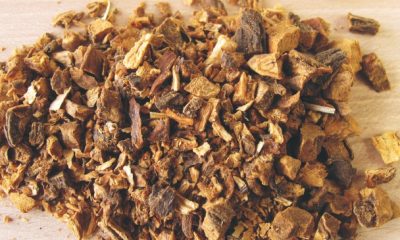Health
15 Health Benefits Of The Muira Puama

Discover the 15 Health Benefits Of The Muira Puama Plant That Work Effectively.
You may want to know more about the health benefits of the Muira Pauma plant, which is very useful for both men and women.
The Muira puama itself is a type of plant within the Olacaceae family. This plant is often used as a herb or medicine by the Amazonian people in Brazil.
Also, people in Brazil trust this plant to be used as an aphrodisiac.
They will take the barks and roots of the plant to use in tonics, supplements, or other forms of drugs for consumption.
The plant itself has its origin in America and that is why; a lot of drugs in this area use it as an ingredient.
Historical use of Muira Puama
The first use of Muira puama in history is made by a Brazilian who is native to the Amazon area.
The people in the Rio Negro are the ones who found the use of this plant for the treatment of neuromuscular problems.
In addition, it is also often used as a treatment for paralysis, as well as for the traditional medication bath.
But currently, the use of this plant is already spreading throughout the world, as it is known to be used as a medicinal herb due to the health benefits of Muira puama.
The European explorer who comes to Brazil brought this plant to Europe. Then it is being used in England in many herbal medicines.
In addition, the Muira puama plant is already included within the Herbal Pharmacopoeia in English, which is the reference for the herbal source used by the herbal association.
There is a lot of research being done in many parts of the world for this plant, so you can learn more about the health benefits of Muira puama in humans.
Even though this flowering plant is mainly known for its improvement of sexual insufficiency and the problem of impotence, it turns out that there are still many other benefits that people can get from it.
That is why; many medicines that are made with natural ingredients also list Muira Pauma.
Health benefits of the Muira Puama plant
1.- Treatment of sexual weakness
This plant is frequently recommended to be used as traditional aphrodisiac medicine or herb that can promote sexual function.
Furthermore, the Brazilian pharmacopeia had already included this plant since the 1950s.
There is research on the use of this treatment that is applied to 262 men who experience sexual weakness.
Based on that research, it is found that this plant can increase the sexual capacity of half of the men participating in the research.
This plant can improve erection capacity. Furthermore, this ability is also shown in older men who also experience sexual function problems.
2.- Prevention of infertility
In addition to treating sexual weakness, this plant can also be used to prevent infertility.
Infertility in men will cause the level of testosterone to drop and cause difficulties in ejaculation.
Testosterone itself is an important hormone in men that works in both sperm production and the release process.
However, this plant has sterol that can greatly improve testosterone level by helping in the testosterone block building process.
3.- Treatment of frigidity
Also, it is useful for men, but it is also useful for treating frigidity in women.
There is an investigation carried out at the 1990 institute of sexology in Paris for 202 healthy and cold women.
Based on this research, about 65% of the participants experience some increase in their sexual satisfaction and desire or libido.
That is why; This plant is also used as herbal medicine by women to enhance fantasy and orgasm.
4.- Treatment of PMS
Another health benefits of the Muira puama plant are that it can be used as a PMS treatment.
Before the menstrual period, women often experience PMS such as oysters, mood swings, feelings of the week, and many others.
The Brazilian already uses this plant as a PMS treatment naturally.
5.- Treatment of neurasthenia
Neurasthenia itself is a condition in which there is some disorder in the nerve of the brain.
Due to this condition, people who experience it will experience fatigue, a feeling of being unmotivated, a headache, a feeling of lack of adaptation, and many others.
There is research showing that this plant can be used as a treatment for neurasthenia, as it can improve brain function and thus alleviate the symptoms of neurasthenia.
6.- Depression treatment
It turns out that the research on this plant to learn more about the health benefits of the Muira puama plant is also done in Germany.
Research is carried out on the use of this plant as a tonic for the central part of the nervous system.
Research shows that the use of this plant in a certain amount can reduce depression in the nervous system and improve mood, so it can be used as a treatment for depression.
The reason is that this plant can improve the functioning of the central part of the nervous system so that the function can be performed properly and alleviate the disorder related to the mental problem.
7.- Treatment of rheumatoid arthritis
One type of autoimmune disease also causes rheumatoid arthritis because the body’s immune system cannot function as it normally should.
Therefore, the immune system cell will attack a healthy cell of the person himself, so it can cause rheumatoid arthritis which makes the joints painful.
But when the person consumes this plant, it can alleviate the painful symptom.
8.- Stomach and Diarrhea Treatment
The next health benefit of the Muira puama plant that you can get is using this plant as a stomach treatment.
Therefore, if you experience some symptoms of stomach pain such as vomiting, nausea, morning sickness, and many others, you can try consuming this natural herb.
Furthermore, it can also be used as a treatment for diarrhea, which is a problem in the digestion tract.
Usually, when there is a problem in the large intestine, it can create watery stools. The reason is that the large intestine cannot absorb the water from inside the stool in the process of defecation, which causes diarrhea to happen.
However, there are still other causes that can cause diarrhea, such as consuming spicy or acidic foods, bacterial infections, and many others. But consuming Muira puama can help reduce symptoms.
9.- Alzheimer’s prevention
By consuming this plant, your brain will have enough acetylcholine that works as a neurotransmitter in the brain.
If the level of this acetylcholine is not enough, there will be a dangerous impact on the brain and can cause the development of Alzheimer’s disease.
Therefore, by consuming this plant, the brain can be healthier and function better, which is why it works as an Alzheimer’s prevention, especially in older people.
10.- Cancer prevention
These health benefits of the Muira puama plant may be important since this plant can be used for cancer prevention.
The reason is that it contains lignans, which is a substance that can prevent the development of some types of cancer that affect the sexual organs.
For example, ovarian cancer, endometrial cancer, breast cancer, and prostate cancer.
11.- Treatment of paralysis
Another benefit that you can get due to this plant that can affect the central part of the nervous system is the treatment of paralysis.
This benefit has been implemented by people in the Amazon for a long time.
12.- Improvement of heart weakness
Heart disease can be started by heart weakness as a sign. Also, it can develop further if we don’t treat it properly.
However, by consuming this plant, you can get health benefits from the Muira puama plant, which can improve that condition.
13.- Improved sleep quality
Taking a supplement that contains this plant can also be used as an improvement in the quality of sleep.
In addition, it will make you feel comfortable and you will be able to sleep more soundly.
If you have trouble sleeping due to stress, then you should also try taking muira puama as this plant can reduce stress so that you can sleep better.
After taking it, it can improve your mood and increase your sense of well-being.
Even if it is not causing you some difficulty sleeping, it can still eliminate the feeling of stress, therefore it is good to consume.
14.- Improving Baldness
Although some people consider baldness to be normal, sometimes people feel stressed when they experience this problem.
So it may not be a dangerous problem, but it is still a serious problem for some people.
That is why; You may want to consume this plant to improve the condition by reducing hair loss.
15.- Improved resistance
In Brazil, many people use the health benefits of the muira puama plant as a body stimulant.
They create the tonic by combining this plant with guarana and ginger.
This will add caffeine content to the tonic which can also be used to improve the body’s resistance when consuming it.
Those are several health benefits of the muira puama plant that you can get by consuming this plant as a tonic, herbal medicine, supplements, and many other forms.
If you consume it in the correct dosage, you will be able to reap those benefits for your health.
Tips for correctly consuming Muira Puama
You can find many supplements, herbal medicines, and many other forms of muira puama in the traditional local market or in health food stores.
Sometimes muira puama is applied topically to the skin or consumed as a medicine.
Also, this ingredient can be combined with other herbs to increase the effectiveness of this plant.
But remember that when you want to consume muira puama to get the benefits, then the use must be in the correct dosage.
If you use too high a dose of muira puama, then you may experience insomnia due to this.
The reason is because of the benefits of this plant that it can increase the alertness of the brain, which in turn makes it difficult to sleep.
When that happens, the dosage of the supplement you take may be too high for you, therefore you may want to lower it.
If you can find the correct dosage to consume, you will surely reap the health benefits of muira puama.
Remember that the correct dose for each person is different, as it largely depends on many types of factors, for example, age, health, and many others.
That is why; You must follow the consumption direction of the product you consume to be safe.
Generally, the medicine that contains muira puama is a tincture medicine, which is an alcohol base since this substance is not easily soluble in water since it contains resin.
For this reason, muira puama that is created in tea or capsule form is less effective compared to those that are created in the alcohol-based formula.
This is why you need to make sure that you are correctly taking the medicine if you want the medicine to work effectively.
Health
10 shocking health benefits of rosemary tea

Table of Contents
Health
Benefits of fasting for 24 hours

Discover the benefits of fasting for 24 hours.
24-hour intermittent fasting is often recommended for weight loss, but also its many health benefits.
In this article, I detail the benefits of intermittent fasting, and particularly its practice over 24 hours. You will also be able to find my testimonial and my advice for a successful 24-hour intermittent fasting.
24hr Intermittent fasting to live longer in good health!
This sentence comes up constantly when one is interested in the subject. Simple fashion effect or real health interest? That’s the real question.
The objective of this practice is based on calorie restriction and resting the digestive system as a whole.
When we eat too much, binge, and get too much protein, our aging process is accelerated. Our body ages faster. To counter this effect, it is, therefore, necessary to fast. You boost your production of growth hormone, a hormone of youth.
In practice, it remains very complicated. It was Dr. Valter Longo who simplified the practice of intermittent fasting to reap all the health benefits. But in reality, is it effective?
The benefits of 24 hours intermittent fasting
Many scientific studies have highlighted the following health benefits of intermittent fasting:
• Promote weight loss, maintenance, lower bad cholesterol and increase well.
• Reduce cardiovascular and cancer risks.
• Regulate blood sugar by lowering insulin production and increasing fat metabolism.
• Lower the markers of inflammation ( responsible for the aging process ).
• Stimulate growth hormone production ( 2000% during 24-hour intermittent fasting ). This molecule helps you fight to age, tap into your fat and increase your muscle mass.
• Regulate hormonal disturbances after meals.
• Diversify the composition of the intestinal flora.
• Improve the quality of sleep.
It should be noted that these benefits are mainly found in a population that is overweight or obese, sedentary, or suffering from metabolic disease. The effects of intermittent fasting in healthy, physically active, or athletic people seem small to non-existent.
Intermittent fasting and weight loss
According to scientific research, intermittent fasting is effective for weight loss.
The main reason for the effectiveness of intermittent fasting on weight loss is calorie restriction.
Indeed, skipping one or more meals considerably reduces your food consumption. You then find yourself in an energy deficit, and your body has no choice but to draw on the stock of glycogen and fats to continue to function.
Practiced 1 to 2 times a week, over 3 to 24 weeks, intermittent fasting can lead to a weight loss of 3 to 8% of the initial weight, with a non-negligible share of abdominal fat (reduction in the circumference of cut).
However, over the long term, the evidence on the effectiveness of intermittent fasting remains very weak. We don’t know if, as with all low-calorie diets, it leads to a Yoyo effect and significant regain of lost pounds.
To lose weight permanently, mainly fat, while maintaining your muscle mass, it is advisable to combine a slight caloric restriction and the practice of sport regularly.
Need to lose weight permanently?
My Sport to lose weight program has already enabled hundreds of people to lose weight, improve their health and be in better shape! It includes sports sessions in videos, tools to calculate your fat loss, tips for starting running, recipes, and much more… It’s never too late to start the sport and lose weight for your health.
Opinion on the intermittent fasting 24h
So I wanted to get to the bottom of it and test this practice. To simplify things, Dr. Longo has been testing different protocols for several years. Simpler protocols to apply daily while maintaining the benefits. For people with a healthy lifestyle, practicing 24 hours a month is very effective.
So I fasted for 24 hours. The easiest way is to start after dinner. You eat dinner normally, then nothing until dinner the next day. Hydrate well. You can also consume tea, coffee, infusions but without sugar.
I was afraid of being too hungry, of being a wreck unable to move. And not at all. I did my intermittent fast one day back from vacation, in the car. I felt good, without a stroke. What a pleasure to sit down to eat in the evening, even if the goal is to eat normally and no more than usual.
I resumed the sport the next day with a big day ( 3h30 of cycling chained to 1h of jogging ). I felt good, I didn’t have any cravings. I even recovered better. I am full faster on the meals that follow. The results are very positive.
However, here are some tips to guide you:
• No sport on the day of intermittent fasting, or a short cardio session (30 minutes).
• Take care. Get out of your house, otherwise, the day will be too long to manage unless you have plenty of tasks to accomplish.
• Don’t throw yourself on the food when you eat again. Don’t say to yourself: “it’s good, I’ve done the hardest I can let go”.
• Remember to drink well ( 1.5 to 2 liters of water ) and take hot drinks for satiety.
Be careful if you have medical treatment, do not do it. I do not know the actions of this practice under these conditions. A drug does not have the same effect in these conditions, so check with your doctor.
I await your reactions after your tests. Intermittent fasting is increasingly practiced in the United States, to fight against junk food and diseases of civilization. Its health benefits are undeniable. Live old and above all live better!
Health
Benefits of hibiscus tea for skin

Table of Contents
- Benefits of hibiscus tea for skin
- Greater elasticity in the skin
- Prevents and fights cell damage
- Hydrates in depth
- Unifies skin tone
- Discover the benefits of hibiscus tea for skin.In today’s post we want to offer you a wonderful option to enhance your health and even take care of your beauty with a gift from nature whose qualities have been known for thousands of years.
We want to talk about the Hibiscus tea, a plant native to China and Japan, also known as China rose, whose extract has a wide range of properties, among which are antiseptic, digestive, diuretic, and others that we will detail below.
Its cosmetic properties are so amazing that it has been called “vegetable Botox”, rich in antioxidants and vitamin C.
Its effects after constant consumption in the form of an infusion, for example, have been compared to the effects of Botox injections, since its tightening effect helps to hide expression lines and sagging of the face.
Its active components act at the cellular level, nourishing and moisturizing the dermis, creating a wonderful anti-aging effect.
There are 5 different varieties of Hibiscus in the world: Hibiscus Rosa Sinensis, the best known in Spain, Hibiscus esculentus, Hibiscus sabdariffa, and Hibiscus tiliaceous.
Its flower is edible and its different forms of presentation, in powder, in preparation for infusion, or syrup, allow us to take it comfortably and prepare masks that will surely become great allies for your skin and hair.
In India, hibiscus has traditionally been used to treat hair problems, reduce dandruff, moisturize the scalp while nourishing and strengthening it, and even prevent the appearance of gray hair.
Benefits of hibiscus tea for skin
Greater elasticity in the skin
As we have previously mentioned, the Hibiscus tea will provide us with its tensor effect, greater elasticity, and firmness in the skin, keeping it looking young for longer.
Prevents and fights cell damage
Hibiscus tea fights free radicals that cause oxidation that starts the aging process in the skin, the largest and heaviest organ in the body.
Hydrates in depth
After using the usual cleansers we remove the moisture and natural agents that protect our skin, if we regularly use hibiscus masks we will ensure that our facial skin is sufficiently hydrated avoiding dryness and its unwanted consequences.
Unifies skin tone
Hibiscus is known for its exfoliating and anti-blemish action and its beneficial effects in cases of hyperpigmentation, unifying the tone and softening the features.
For all these benefits, the Hibiscus tea is considered a natural and effective anti-aging recipe, do not forget to try it.
Related Searches…
Hibiscus tea for skin whitening
Hibiscus tea benefits hair
How to make hibiscus tea
Benefits of hibiscus for lips
Hibiscus for skin tightening
How to use hibiscus for acne
Benefits of hibiscus oil for skin
Hibiscus flower benefits for hair and skin
Hibiscus tea effect on kidneys
Hibiscus powder benefits
Homemade hibiscus face cream
Hibiscus soap benefits for skin
-

 Benefits4 months ago
Benefits4 months agoThe Benefits of Joining Gym Lumolog – Improve Your Fitness & Health
-

 Food1 year ago
Food1 year ago10 + Benefits of carrot juice and side effects
-

 Health1 year ago
Health1 year ago50 Super Healthy (And Very Often Cheap) Foods
-

 Health1 year ago
Health1 year ago5 Shocking health benefits of kinkeliba and side effects
-

 Health1 year ago
Health1 year ago15 health benefits of soursop leaves tea and side effects
-

 Food1 year ago
Food1 year ago8 shocking benefits of leek juice and side effects
-

 Health1 year ago
Health1 year ago15 Benefits of lipton tea and side effects
-

 Health1 year ago
Health1 year agoBenefits of guava leaves Sensually












